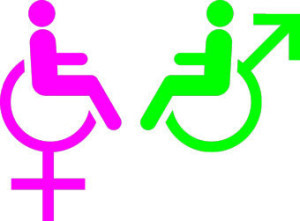The prevalence of disability among women is higher than among men. The WHO ‘World Report on Disability’ (2011) estimates that 19% of women and 12% of men have a disability.
 Women are more likely to develop a disability throughout their life course through, e.g., childbirth, abuse, poor health and poverty. Women with disabilities face exclusion from education and employment and are at higher risk of violence, neglect and poverty than women without disabilities. Gender and disability combine to form some of the most severe forms of marginalisation and discrimination.
Women are more likely to develop a disability throughout their life course through, e.g., childbirth, abuse, poor health and poverty. Women with disabilities face exclusion from education and employment and are at higher risk of violence, neglect and poverty than women without disabilities. Gender and disability combine to form some of the most severe forms of marginalisation and discrimination.
Experience has shown us that unless disability is specifically included into development programmes and activities, women and girls with disabilities will not benefit from them. It is crucial then to rethink definitions and approaches to disability, alongside social and political action. Disability has gained interest spike in disciplines such as history, literature, philosophy but more often than not scholarly work refuses to recognize disability broadly in their reflections on gender.
This special issue edited by Professor Anita Ghai (anitaghai@aud.ac.in) invites scholars to demonstrate the ways in which intersectional gender scholarship is central to the field of disability. Analyses attentive to disability will enhance the conversation and fill the gaps in gender scholarship.
Contributions might focus on, but should not necessarily be limited to the following topics
- Changing historical experiences of disability and gender
- Dis/ability, gender and sexuality
- The relationship between wwd and citizenship
- Political economy of disability and gender
- Cultural representations of disability and gender
- Care, Dependence and interdependence
- Disability, gender and embodiment
- Disabled women and violence
- Disability, gender and reproductive health
- Representation of women with disabilities in cinema.
SUBMISSION INSTRUCTIONS
Submit your abstract by 10th April, 2018 for consideration to anitaghai@aud.ac.in . It should concisely describe your work and be 150-200 words in length.
The acceptance after review of the abstract will be sent by 30th April. The last date for submitting the complete paper (5000-8000 words) for review is 30th June, 2018.